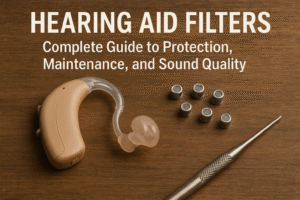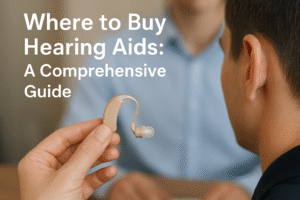
Hearing loss affects millions worldwide and can greatly impact communication, relationships, and overall quality of life. Many people wonder whether hearing loss can be fixed, and the truth is that the answer depends on the type, severity, and cause of the condition. From medical treatment for hearing loss to natural remedies and even surgery for hearing loss, there are multiple ways to address the problem and improve hearing health.
This guide explores everything you need to know about hearing restoration, practical hearing improvement tips, and how to choose the right solution for your specific condition.
Understanding Hearing Loss
Before discussing how to fix hearing loss, it’s important to understand what it is and how it happens. Hearing loss occurs when part of the auditory system—outer ear, middle ear, inner ear, or auditory nerve—doesn’t work properly. It can be temporary or permanent, mild or profound.
Types of Hearing Loss
- Conductive Hearing Loss – Caused by blockages or damage in the outer or middle ear, often treatable with medical procedures or surgery.
- Sensorineural Hearing Loss – Results from damage to the inner ear (cochlea) or auditory nerve; usually permanent but manageable with hearing aids or cochlear implants.
- Mixed Hearing Loss – A combination of conductive and sensorineural factors.
- Sudden Hearing Loss – Rapid loss of hearing, often requiring urgent medical attention.
Can Hearing Loss Be Restored?
The possibility of hearing restoration depends on the root cause. Some conditions can be fully reversed, while others require long-term solutions.
- Temporary hearing loss (due to earwax buildup, infections, or fluid) can often be treated with simple medical care.
- Sensorineural loss is generally permanent, but hearing aids and cochlear implants can significantly improve hearing ability.
- Surgical hearing loss treatments may restore function in cases like otosclerosis or chronic middle-ear problems.
Medical Treatment for Hearing Loss
Professional medical care remains the most effective way to fix many forms of hearing loss.
Common Treatments Include:
- Earwax removal –A Simple procedure to restore normal hearing.
- Medication for infections – Antibiotics or antifungal treatments.
- Steroid therapy – For sudden sensorineural hearing loss, prescribed early.
- Hearing aids – For mild to severe sensorineural hearing loss, they amplify sound.
- Cochlear implants – A surgical hearing implant option for profound loss when hearing aids are not sufficient.
- Bone conduction devices – For patients who cannot use traditional aids.
Surgery for Hearing Loss
Some forms of hearing loss can be corrected surgically.
- Stapedectomy – Surgery to replace the stapes bone in otosclerosis.
- Tympanoplasty – Repairing the eardrum to improve sound transmission.
- Cochlear implants – Bypass damaged hair cells in the cochlea to directly stimulate the auditory nerve.
- Bone-anchored hearing aids (BAHA) – For conductive or mixed hearing loss, transferring sound via bone conduction.
These options are suitable for individuals with specific medical conditions and should be discussed with an ENT specialist.
Natural Remedies for Hearing Loss
While not a replacement for professional medical treatment, some people explore natural remedies for mild or age-related hearing loss.
- Diet and nutrition – Foods rich in antioxidants, folic acid, and omega-3 fatty acids may support ear health.
- Exercise – Improves blood circulation, which benefits the auditory system.
- Ear hygiene – Safe cleaning prevents blockages and infections.
- Avoiding loud noises – Reduces risk of worsening hearing damage.
- Herbal supplements – Some use ginkgo biloba and magnesium, though scientific evidence is mixed.
It’s important to note that natural remedies may help support hearing health but rarely cure existing hearing loss.
Hearing Improvement Tips
Even if hearing loss cannot be fully reversed, certain strategies can greatly enhance hearing ability and quality of life.
- Use assistive listening devices like TV amplifiers or FM systems.
- Practice good communication strategies – face-to-face conversations, lip reading, and reducing background noise.
- Protect your ears with earplugs in noisy environments.
- Schedule regular hearing tests to track changes and update devices.
- Stay socially active to keep the brain engaged in processing sounds and speech.
Preventing Hearing Loss
Prevention is often easier than treatment. Simple lifestyle changes can go a long way.
- Keep music and headphone volume at safe levels.
- Take listening breaks to reduce ear strain.
- Use protective equipment in workplaces with loud machinery.
- Manage chronic conditions like diabetes and high blood pressure, which can affect hearing health.
When to See a Doctor
Seek immediate medical help if you experience:
- Sudden hearing loss in one or both ears.
- Ringing in the ears (tinnitus) with hearing difficulty.
- Pain, dizziness, or fluid discharge from the ear.
- Gradual but noticeable difficulty in conversations.
An ENT hearing specialist can diagnose the exact cause and recommend the right medical treatment for hearing loss.
Conclusion
Fixing hearing loss is not always about a single cure—it’s about finding the right solution for your unique needs. For some, surgery for hearing loss provides long-term improvement. For others, hearing aids, cochlear implants, or lifestyle changes offer the best path to hearing restoration. Natural remedies and hearing improvement tips can support ear health, but professional care remains the cornerstone of treatment.
If you or a loved one struggles with hearing difficulties, the first step is a professional hearing evaluation. Early intervention ensures better outcomes and helps you stay connected to the world around you.







